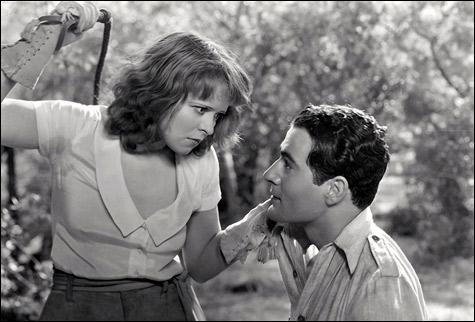
HURT ME! Clara Bow is a feisty Western heiress in Call Her Savage. |
The fleeting few years between the very early talkies (1927-’29) and the institution of Hollywood’s self-imposed censorship in the form of the Production Code in 1934 produced some of the liveliest and most adult entertainment in the history of the movie industry. Nothing remotely like it would be seen again until the Code finally fell apart in the ’60s, exhausted by repeated challenges from filmmakers. Inspired by Brandeis film-studies professor Thomas Doherty’s new book, Hollywood Censor: Joseph I. Breen and the Production Code Administration, “Vice vs. Virtue in Pre-Code Hollywood,” at the Harvard Film Archive this weekend, is the latest entertaining series to pay tribute to this fascinating era. (Doherty will be on hand this Friday evening to introduce the first two pictures.)
All 10 of the pictures in the collection were released between 1932 and 1934, and they address the tension between virtue and vice in strikingly different ways. In the brisk, evocative EMPLOYEES’ ENTRANCE (January 21 at 7 pm), the ruthless manager (Warren William) of a Manhattan department store struggling to stay solvent during the Depression takes pity on a young woman (Loretta Young) he discovers camping out in the model-homes department after closing time. He offers her a job modeling women’s clothes, but his generosity comes at a price: she has to sleep with him. In BLOOD MONEY (January 18 at 7 pm, with Call Her Savage), the hero (George Bancroft) is a bail bondsman named Bill Bailey — he hands out his own special brand of cigars with the imprinted motto “Bailey for Bail” — with a wide popularity in the underworld. But though he has a scandal in his past (he was thrown off the police force for accepting graft), Bailey conducts his affairs according to a strict code of honor. Played by the ebullient Clara Bow in her penultimate film, Nasa “Dynamite” Springer, the heroine of CALL HER SAVAGE, is a feisty Western heiress who resists the efforts of her disdainful, icy father (Willard Robertson) to control her — he wants to marry her off to a man she doesn’t love. But underneath her fiery temper and wild behavior is a woman of sensitive impulses chafing against a world in which she hasn’t yet found her place. Although Nasa’s escapades lead her into some unusual corners — in one scene a high-society escort takes her to a Greenwich Village club where men perform in drag and an anarchist (Mischa Auer) who recognizes her date as a millionaire’s son tosses food at them — the movie is careful never to show her engaged in anything truly illicit. Desperation — a sick baby — almost drives her to the streets, but circumstances conspire to keep her virtue intact.
 Related
Related:
Hardboiled hub, Reflections on a golden filmmaker, Moral minority, More 
- Hardboiled hub
When I was growing up in Roslindale a few decades back — among tribes of ignorant, second-generation immigrant kids whose favorite words began with “f” and “n” and who liked to torture small animals and beat up small children before they moved on to their future vocations as petty criminals, dead dope users, or real-estate agents.
- Reflections on a golden filmmaker
John Huston had such a long, illustrious career as a film director — just a few years short of half a century — that any series in his honor that isn’t comprehensive has to feel truncated.
- Moral minority
“It’s incorrect to assert that traditional Hollywood films always have happy endings,” film historian Thomas Doherty once noted on a panel I attended.
- Dark passage
The Production Code, Hollywood's notorious self-censorship program, was instituted by the Motion Picture Producers and Distributors of America in 1930, but it didn't go into effect till 1934, when it was administered by Joseph I. Breen.
- ID Check: Chelsea Spear
Chelsea Spear grew up in Medford, back when it was strictly a working-class enclave known largely for “big hair, Spandex, and KISS-108,” so she understands the injuries of class.
- Coming back to life
The season at Maine State Music Theatre opens with the beautiful music of Always...Patsy Cline , Ted Swindley's feel-good celebration of the remarkable singer (Jenny Lee Stern) and her charms both on and off the stage.
- Less

 Topics
Topics:
Features
, Entertainment, Emperor Nero, George Brent, More  , Entertainment, Emperor Nero, George Brent, Mae West, Movies, Brandeis University, Charles Laughton, George Bancroft, Bill Bailey, Clara Bow, Less
, Entertainment, Emperor Nero, George Brent, Mae West, Movies, Brandeis University, Charles Laughton, George Bancroft, Bill Bailey, Clara Bow, Less 